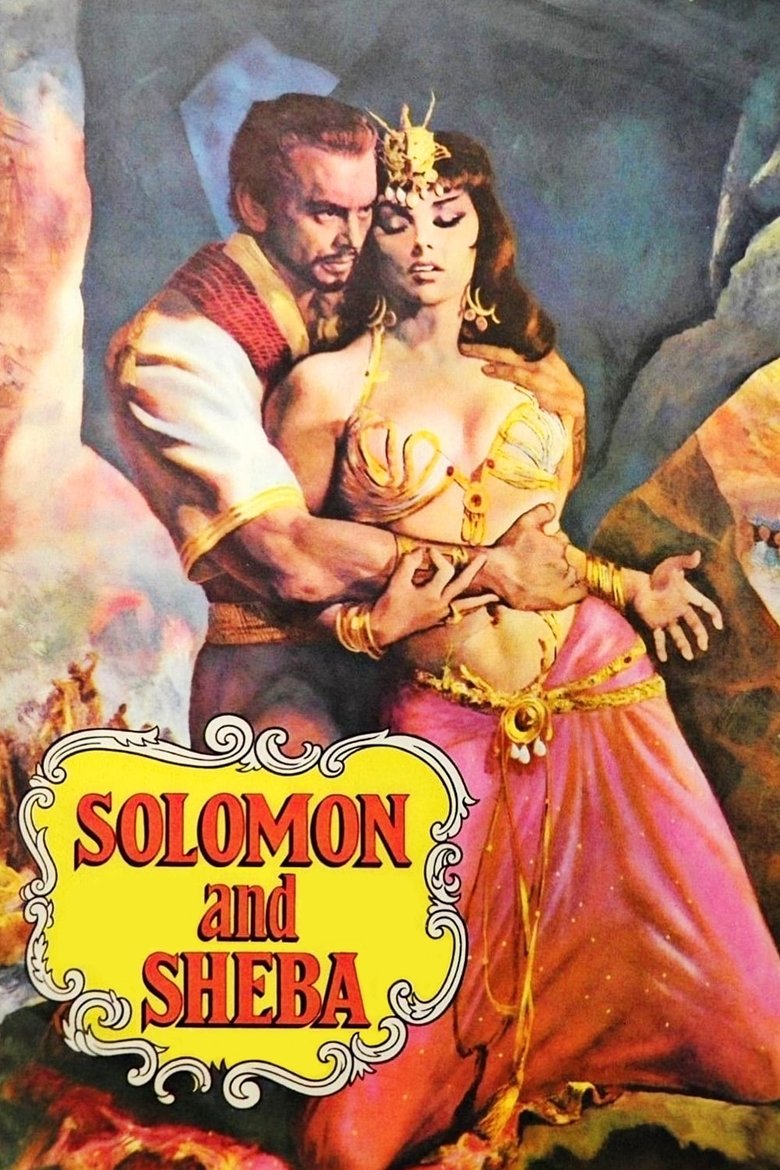
Solomon and Sheba
Near death, King David has a vision that his poet son, Solomon, should succeed him, rather than hot-headed Adonijah. Furious, Adonijah departs the court, swearing he will become king. Other rulers are concerned that Solomon's benevolent rule and interest in monotheism will threaten their tyrannical, polytheistic kingdoms. The Queen of Sheba makes an agreement with the Egyptian pharaoh to corrupt Solomon for their mutual benefit.

John Chard@John Chard
It is said that Solomon is wise. But no matter how wise he may be, he is still human, with a human weakness.
Solomon and Sheba is directed by King Vidor and collectively written by Anthony Veiller, Paul Dudley, George Bruce and Crane Wilbur. It stars Yul Brynner, Gina Lollobrigida, Marisa Pavan, George Sanders, David Farrar, Harry Andrews, John Crawford and Laurence Naismith. Music is by Mario Nascimbene and cinematography by Fred A. Young.
A fictionalised screenplay cribs from parts of the Bible, where the story here follows the relationship between Solomon of Israel and the Queen of Sheba, a problem because initially Sheba is in league with Israel's enemy, Egypt. All that and Solomon has to deal with his nefarious brother, Adonijah, who is a little miffed that Solomon has inherited the crown of Israel.
Famously it was the production that saw the sad death of the leading man, Tyrone Power, while Vidor was so disillusioned about the whole film he quit making feature length films. It's a very mixed bag, very much showing the good and bad sides of the big historical epics that dominated Hollywood back in the day. In part it's a grandiose melodrama, in others it's cheap looking and given to campy histrionics (the orgy operatics sequences are just awful), while the screenplay jostles with itself as to being biblical blarney or potent pontifications.
Costuming and colour photography smooths the eyes, but then the optical nerves are shredded by set design so poor a child making paper mache boulders could have done better. The cast are also in and out, Brynner is fine as Solomon (broody, brainy but troubled), as is the lovely Lollobrigida (stoic, smart and sexy), but the support slots barely convince. Sanders is badly miscast as Solomon's warrior brother Adonijah (he was 53 at the time), 10 years earlier in Samson and Delilah his villain turn worked, but not here.
Sword fighting choreography is poor, as are the miracle effects work, but conversely the big battle that crowns the story is smart in writing and in execution, where not even the model work can dim the thrill of it all. Released in the same year as "Ben-Hur" obviously does it no favours by comparison! But then so many other big swords and shields epics would also struggle as well. Vidor's movie is just above average in the genre pantheon, but the faults are irritable and hardly render it as a must see film for genre enthusiasts. 6/10

Wuchak@Wuchak
_**Hollywood’s account of wise King Solomon’s reign in Israel, including his folly**_
In the 10th Century BC, elderly King David’s reign is ending and there’s a dispute between siblings Adonijah (George Sanders) and Solomon (Yul Brynner) about who will take over the kingdom. Once this is settled, the Queen of Sheba (Gina Lollobrigida) visits Israel for dubious reasons and Solomon becomes entranced.
“Solomon and Sheba” (1959) is a biblical epic covering the first eleven chapters of 1 Kings with bits & pieces of other scriptural characters/stories thrown in, plus the fabrication that Solomon had an affair with the Queen of Sheba. In truth, the Queen visited Israel because she heard of Solomon’s great wisdom and wanted to test it for herself, plus witness the splendor of the renowned kingdom. While the movie shows Solomon’s harem of hundreds of wives & concubines, the scriptwriters decided to make the Queen of Sheba a microcosm of these women for dramatic purposes. So it’s true that Solomon’s foreign wives led him astray into idolatry and disfavor with the LORD, it just wasn’t the Queen of Sheba who did it.
Nevertheless, I thought there were enough historical truths to roll with the film and appreciate it despite its fabrications and bloated talky-ness. For instance, Adonijah really did seek to usurp the throne, but the way the story evolves in the movie is false. Yet I liked the inclusion of several real-life characters beyond those already mentioned, like Bathsheba, Abishag, Joab, Nathan, Zadok and Pharaoh.
Meanwhile Brynner is stately as the protagonist and Gina is ravishing, not to mention the costumes, sets, action pieces and score are all well done. Speaking of the score, power rock/metal bands of the 70s-90s were obviously influenced by parts of it (e.g. Rainbow, Savatage, Manowar, Crimson Glory, Bathory, Jag Panzer and so on). Rock ‘n’ roll bands of the late 50s-early 60s certainly weren’t playing this kind of dramatic stuff with their pop ditties!
Interesting trivia: Tyrone Power originally played Solomon and two-thirds of the film was shot with him when he suddenly died after the sword duel with George Sanders (Adonijah), which is when Brynner was brought in for the starring role and the movie was completed in ten more weeks. Director King Vidor preferred Power because he depicted Solomon’s conflicted spirit better whereas he believed Yul played him with too much self-assurance. While the troubled film turned out to be a box office success, it would be Vidor’s final feature film.
It’s worth checking out if the topic and actors interest you, but it’s not as compelling as “Samson and Delilah” (1949), “The Ten Commandments” (1956) and “Ben-Hur” (1959). Still, it’s not far off; you just have to be willing to swing with the alterations to history.
The movie runs 2 hours, 21 minutes, and was shot entirely in Spain.
GRADE: B-
